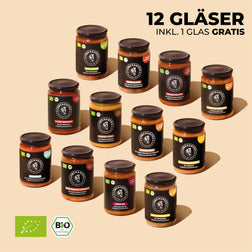Brainfood - is there an optimal diet for the brain?
Only the Anglicism Brainfood is new. It is a well-known and scientifically proven fact that certain foods boost brain performance. To refute an unfortunately widespread misconception: Eating certain foods does not make you smarter. Rather, it is about supplying the brain with suitable nutrients. Basically, our most important organ is not particularly demanding and only needs sufficient water, certain fats, carbohydrates and proteins. But then again, it's not that simple. As is always the case with nutrition, what types of a given nutrient you are “feeding” to the brain is very important. We have broken down the individual “brainfood” categories for you. Finally, we also look at the e-sports use case.
Your brain needs enough water
Water would probably never be called “brain food” in the vernacular. However, the fact is that our brain consists of around 75% water. For this reason alone, the human supercomputer is dependent on a regular supply of water. Our brain consumes up to 25% of our body's total energy at rest alone! To keep this impressive brain working efficiently, you should drink at least two liters of water or tea every day. If you want to give your brain a special treat, then we can recommend green tea. This not only has an anti-inflammatory and blood circulation-promoting effect, but also demonstrably stimulates brain performance. However, whether coffee can be included in the water balance remains controversial. In the meantime, however, it has at least been established that the popular stimulant does not deprive the body of water. If in doubt, just drink a glass of water or a cup of green tea more. If you exercise regularly, your body has an increased need for water due to the high energy consumption.

At this point, there was originally an image by eehotwater.com.au, whose usage rights were unclear. Therefore, it was removed.
What fats, carbs, and proteins your brain likes
Our brains clearly prefer certain types of fats, carbohydrates and proteins. With regard to fats, you should make sure that your brain is mainly supplied with unsaturated fatty acids. These include omega-3 fatty acids, which your body cannot produce itself. You can find these important fats in fish species such as salmon, but also in nuts such as cashews or Brazil nuts. Nuts also provide your control center with important minerals and B vitamins.

There are also differences in the carbohydrates. Your brain primarily needs complex carbohydrates, which are gradually converted into glucose by the body. This substance, also known as fructose, is the most important source of energy for the high-performance computer between your ears. Complex carbohydrates are found in foods like potatoes, whole grains, and legumes. On the contrary, products like chocolate contain simple carbohydrates, which provide a quick boost of energy - but their effect breaks down just as quickly.
Proteins are urgently needed everywhere in the body, and your brain is no exception. Specifically, there is a need for amino acids, which are contained in proteins. These acids are needed by the body, including the brain, to support the body's own proteins. Meat and milk are probably the most popular sources of protein in Germany. Vegetable protein sources such as lentils or chickpeas are less well known and less common. The attentive reader may notice that these foods also contain complex carbohydrates and fiber. So, by consuming legumes, you are doing your brain good in two ways.

Brain food and eSports
The fact that gamers primarily eat unhealthy food only applies to a few hobby gamers. As soon as the e-sports career takes on professional traits, this is accompanied, among other things, by a complete change in diet. In contrast to traditional sports professionals, e-athletes mostly use their brains. During a competition, this is constantly under stress and has to react at lightning speed. Every delay, every drop in brain power is usually immediately punished. Therefore, the consumption of so-called brain food plays a major role for professional gamers. Regular intake of anti-inflammatory foods such as broccoli is particularly important. These reduce the stress level, which means that the players are mentally fitter for the competition. When it comes to the diet of e-athletes, great importance is also attached to stomach compatibility. Otherwise you risk a lack of concentration and unnecessary expenditure of energy to digest hard-to-digest food. Even if it contradicts the classic gambler cliché, e-sports and fast food are completely incompatible. Many products such as chickpeas or lentils, which have been proven to support brain performance, are also used in our ready meals.




